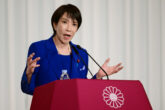February 17, 2025
The Superpower Has Left the Building: Munich 2025
This article was originally published in War on the Rocks.
National security’s Burning Man took place this weekend, as foreign policy types from around the world gathered once again in Bavaria. The Munich Security Conference years ago burst the confines of the Bayerischer Hof hotel, where a medium-sized group of officials and experts once met to talk trans-Atlantic relations. Now it’s a sprawling and frenetic affair, replete with heads of state, bilateral meetings, side events, press conferences, and off-schedule meals. Old touches remain: the Tiki bar, the schnitzel, the smoking section. And while it sometimes feels more cirque than soleil, there is still illumination to be had in Munich.
The new Trump team showed up in force this year: Vice President J.D. Vance, Secretary of State Marco Rubio, Director of National Intelligence Tulsi Gabbard, and CIA Director John Ratcliffe were all there, as was Chairman of the Joint Chiefs C.Q. Brown and a bipartisan delegation from Congress. German Chancellor Olaf Scholz spoke, as did Ukrainian President Volodymyr Zelensky, Chinese Foreign Minister Wang Yi, and a slew of others from multiple continents. And so, the discussions revealed how leaders and thinkers are dealing with the world today.
Behind the frustration and fears of abandonment lies a major question: What will — what can — Europe do about it?
Four themes struck me as emblematic of this year’s Munich zeitgeist.
Trump Acts, Europe Reacts
President Trump set the scene ahead of the conference, stunning Europeans by calling Vladimir Putin and announcing the immediate start of negotiations to end the war in Ukraine. Secretary of Defense Pete Hegseth in Brussels then suggested that Ukraine would not recover its lost territories, that U.S. troops would not deploy to Ukraine after a ceasefire, and that Ukraine would not become a NATO member. While few European officials quibbled with the truth of Hegseth’s remarks, they almost unanimously declared them a tactical mistake. Such concessions should be discussed at the negotiating table, most thought, and it is unwise to give away potential bargaining chips.
Read the full article on War on the Rocks.
More from CNAS
-
Will India Halt Russian Oil Imports Under India-U.S. Trade Deal? U.S. Expert Lisa Curtis Explains
Top foreign policy expert and Director, Centre for New American Security, Lisa Curtis discusses the likelihood of India halting imports of Russian oil under the new India-U.S....
By Lisa Curtis
-
Congressional Support Key for Sustaining Momentum of U.S., UK, Australia Partnership
This article was originally published on The Hill. The fiscal 2026 defense appropriations bill which will be voted on by the House this week allocates $27.2 billion for naval ...
By Lisa Curtis & Ryan Claffey
-
India-EU Trade Deal: A New Superpower Pact | PM Modi Holds Talks With EU Leaders
Lisa Curtis, Director of the Indo-Pacific Security Program at the Center for a New American Security, joined CNN News18 to discuss the recent India-EU trade deal. Watch the f...
By Lisa Curtis
-
Japan Wants Calm, China Not So Much
This article was originally published in Asian Military Review. One of the most serious China-Japan diplomatic crises in recent years unfolded in November after Chinese offici...
By Derek Grossman




